Here on Geeky Hobbies we have reviewed around 850 different board games over the years. Of all of the games we have reviewed very few have received a perfect rating of five stars. One of those few perfect games was the 2015 game Codenames. Codenames is such a great game that is well deserving of all the critical praise and awards that it received. The design of the game was so clever as it created the perfect blend between a word and party game becoming a truly revolutionary board game. I bring this up because the game I am looking at today, Cross Clues, immediately reminded me of Codenames as it utilizes a similar mechanic. Due to how much I love Codenames I really wanted to try out Cross Clues even though it had a lot to live up to. It is obvious that Cross Clues was inspired by the revolutionary Codenames, but by adding in a few unique twists it creates an original and highly enjoyable experience that is almost as great as its inspiration.
We would like to thank Blue Orange Games for the review copy of Cross Clues used for this review. Other than receiving the review copy we at Geeky Hobbies received no other compensation. Receiving the review copy had no impact on the content of this review or the final score.
How to Play Cross Clues
Setup
- The players must choose the difficulty for the game. The difficulty they choose will determine the size of the grid that will be used.
- Easy: 3 x 3
- Intermediate: 4 x 4
- Expert: 5 x 5
- Starting with letter A place enough of the letter tiles to form enough rows based on the difficulty you have chosen. Do the same with the number tiles to form the columns for the grid.
- Shuffle the code word cards and place them in the grid so one word appears next to each letter and number.
- Select the clue cards that correspond to the difficulty you chose. For example for the easy difficulty take A1, A2, A3, B1, B2, B3, C1, C2, and C3. Shuffle all of these cards and place them in a pile face down.
- Choose whether you are going to use the timer. If you choose to use the timer for the expert game you will turn it over twice.
Playing the Game
Cross Clues is a cooperative game that all of the players play together. If you have chosen to use the timer you will flip it over now.
Each player will draw one of the clue cards. In two or three player games you will draw two cards. This clue card(s) will feature a letter and a number. Each player will have to look at the code words that correspond to the letter and number on their clue card and try to come up with a single word that connects the two words together. The clues that players come up with must follow these rules:
- All clues can only be a single word.
- You may not give a clue that utilizes the same root as either of the code words.
- A clue may never be reused in a game.
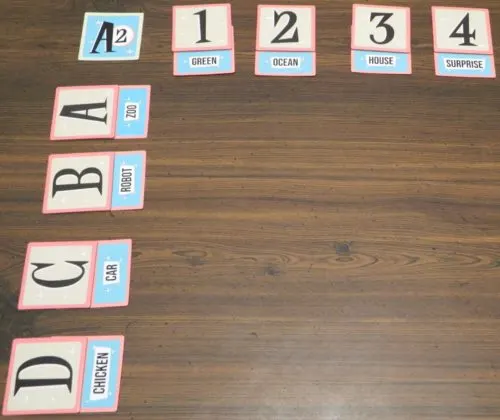
This player was given the A2 clue card. A2 corresponds to zoo and ocean. The player could give the clue aquarium as it corresponds to ocean and zoo.
When one of the players thinks that they have come up with a good clue they will alert the other players. They will then tell the other players their clue. The other players can then discuss the clue to determine where they think the clue fits in the grid. When they have come to a consensus they will announce their choice. The outcome will depend on whether the players guessed correctly.
If the players guessed the right coordinates the player who gave the clue will turn it face up and place it on the corresponding position in the grid.
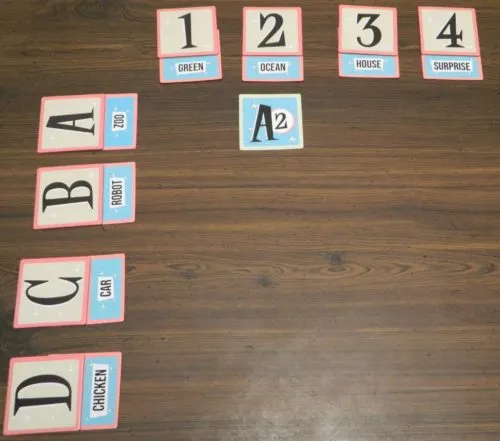
The players correctly guessed A2 from the previous clue. The player who drew the card will place it in the corresponding spot in the grid.
If the players guessed incorrectly the clue card is set aside face down.
In either situation the player who gave the clue will draw a new clue card. All of the players will continue trying to come up with clues for their clue cards.
End of Game
Cross Clues can end in one of two ways. If the players are using the timer the game will immediately end when the timer runs out (in the expert mode you will flip over the timer twice). Otherwise the game ends when a clue has been given for all of the clue cards.
Players count up how many clue cards were correctly placed in the grid. To see how well they did they will compare their result to the following chart:
| Failed | Average | Good | Awesome | |
|---|---|---|---|---|
| Easy | Less than Four | 4-5 | 6-7 | 8+ |
| Intermediate | Less than Eight | 8-11 | 12-14 | 15+ |
| Expert | Less than Twelve | 12-16 | 17-22 | 23+ |
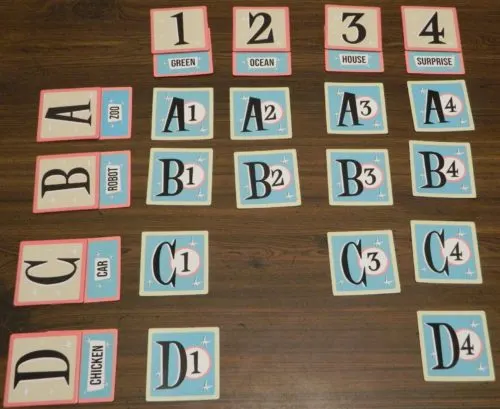
At the end of the game these players were able to get thirteen of the clues correct. Based on playing the intermediate difficulty level these players reached the rating of good.
My Thoughts on Cross Clues
With how many different board games that I have played it is a real compliment to be regarded as one of my favorite board games of all time. Codenames is one of those games as it is in the running for my favorite board game of all time. Due to how much I like Codenames any game that is taking inspiration from the game has its work cut out for it. As soon as I saw Cross Clues I knew that it would play similarly to Codenames. The question then became whether it could live up to Codenames. While I wouldn’t say that it is quite as good, Cross Clues got much closer to Codenames than I was expecting.
This is far from a perfect comparison, but Cross Clues kind of feels like Codenames in reverse. For those not familiar with Codenames you create a grid of word cards. Each team has a set of word cards that they need to guess as well as words that they need to prevent their partners from guessing. Basically the clue giver needs to come up with a clue that corresponds to one or more of their words which will lead their teammates to choosing the correct word cards. The first team to get all of their word cards or have the other team pick the assassin word wins the game.
Meanwhile in Cross Clues things are similar, but also a little different. Instead of getting a set of words that you need to get your teammates to guess, you are given different coordinates in the grid. These coordinates correspond to two different words. You need to come up with a clue that connects these two words. Each clue that is correctly guessed will fill in the corresponding spot in the grid. The objective of the game is to try to fill in as much of the grid as possible. If you choose to use the timer this is also all done on a clock so you need to come up with clues and guess quickly to make sure you can get a guess in for each of the clues.
After reading these two breakdowns it may sound like Cross Clues is very similar to Codenames. In some ways it is as it is pretty obvious that the game took some inspiration from Codenames. Many elements of the game are similar as the game requires the same type of thinking to do well. You need to think of clever connections between two words which may share little in common at first. This requires a lot of skill as just like Codenames some players will be better at giving clues than other players.
Even though you will be giving clues in a different way, the clue giving in Cross Clues feels very similar to Codenames. The difficulty of giving clues in the game is going to ultimately come down to what coordinates you are given. There will be times where you are given a coordinate that has an obvious clue. For example if there are only two colors in the grid and you get the coordinate that corresponds to both of them you can give the clue “colors” and the other players will obviously know what space you are referring to. Many of the coordinates are considerably more difficult though. To fill in many of the spaces you will have to find clever clues while also thinking outside the box. Inside jokes and shared experiences can work really well in this area. Some players are going to be much better at coming up with these clever clues. While it is sometimes difficult to come up with good clues, when you are able to get your teammates to guess a hard combo you feel a sense of accomplishment.
The two games share a lot in common, but Cross Clues also feels like its own unique experience. First there is the fact that the game is cooperative instead of competitive. While I like the competitive nature of Codenames, the cooperative element in Cross Clues is really interesting. I have always been a fan of cooperative games. While competitive games are fun, it is hard to beat a good cooperative game. Cross Clues is a good cooperative game. Players need to work well together in order to be successful. When the players work well together it is quite satisfying being able to fill in most if not all of the grid.
I think the best benefit of the game being cooperative is that all of the players get to be clue givers and guessers at the same time. Instead of taking turns being the clue giver all of the players will be given the opportunity to give clues in the game. You would normally think that players would take turns coming up with clues. This is not the case in Cross Clues as each player will draw their card at the same time allowing everyone to come up with their clues at the same time. Whenever a player has come up with their clue they can just say it without having to wait for their turn.
This might not seem like much at first, but I actually think it is kind of genius. Letting all of the players come up with clues at the same time provides many benefits for the game. First it speeds up the game considerably. Instead of just sitting there waiting for the next player to come up with their clue you can be thinking of your own clue. This means that there is no downtime in the game. You are either thinking of your own clue, trying to decipher another player’s clue, or waiting for the other players to guess your clue. Players that have harder clues can take as much time as they need without slowing down the other players. This also allows the best clue givers to give out more clues than other players that might not give as good of clues. You can even use this mechanic to your advantage if you get a coordinate that you can’t come up with a clue for. You can just wait until all but one of the spaces in a row or column are filled in and then just give a clue that obviously relates to the row or column that only has one space left.
Other than the game being cooperative, Cross Clues just feels like a unique experience compared to Codenames. I can’t exactly pinpoint what it is. The game has all of the elements that I enjoyed about Codenames and yet it also feels different. The game is not different enough that it will appeal to people that hate Codenames. Cross Clues is enough of a unique experience though where it doesn’t just feel like an expansion to Codenames. Fans of Codenames should really enjoy Cross Clues as it feels like a breath of fresh air and a change of pace from Codenames. If you like Codenames but want something a little different and maybe a little more challenging, I would highly recommend checking out Cross Clues.
Let’s move onto the game’s difficulty. While Codenames is pretty easy to play, I would honestly say that Cross Clues is even easier to play. Honestly the gameplay is so straightforward that it is almost self explanatory. Basically you draw a card that corresponds to two words and you try to come up with a clue that connects them together. If the players are already familiar with Codenames you could probably explain the game in just a couple minutes. Those who haven’t played Codenames can probably learn the game in five minutes. The game has a recommended age of 7+ which seems appropriate. The only reason I wouldn’t recommend the game to younger children is the fact that they probably won’t have a strong enough vocabulary to do well in the game.
While the game is easy to learn and play, Cross Clues can be deceptively challenging. The game ultimately comes with three different difficulties. Basically each difficulty level expands the grid by one row and one column. This forces you to guess more clues correctly while also giving you more options for every clue. To judge the different difficulties I checked out all three. We found the easy difficulty to be a little too easy as you can easily fill in the entire grid. With only nine different possibilities it is usually pretty easy to come up with a clue that only applies to one space. Moving onto the intermediate difficulty and the game becomes considerably more difficult. Adding the additional row and column almost doubles the number of possibilities making it much harder to come up with good clues. The expert mode makes the game even more challenging. The more you play the game the better you should get, but the game will still be difficult. We played quite a few games and we generally rated in the higher end of the average score to the lower end of the good scores. With a lot of work we could probably make it to the awesome level but it will be a challenge.
This is partially due to the fact that the game relies on a decent amount of luck. How the code word cards get dealt out will likely determine how successful you can be. No matter how good of a clue giver you are there will be coordinates that you will not be able to come up with clues for. The game features a wide variety of different code words. Some of these words are natural fits while others can be connected with some clever clues. Others share nothing in common though where it is probably impossible to come up with a good clue. At this point you either have to give a random clue hoping the other players randomly guess correctly or you can try to wait until more of the grid gets filled in. If the words line up well you will likely do very well. If they don’t work well though you will probably struggle no matter how good you are. Outside of selectively choosing which code word cards will be used there isn’t much you can do to fix this reliance on luck.
For this reason there are a couple of house rules that I would consider implementing. This will make the game a little easier but I think the game would be better if you could use two or more words for a clue if they are commonly associated with one another. There would have to be some strict rules regarding this, but I think this would have helped overcome some of the reliance on luck. There were situations where players had good clues for some of the more difficult combinations but they couldn’t use them due to the one word limit. Especially for the expert mode I would also like to try out a rule where each player once during the game could send one of their clue cards to the bottom of the pile to be redrawn at the end of the game. I think this could be useful in dealing with the situations where you get combinations that share nothing in common.
Despite relying on quite a bit of luck the good news is that Cross Clues plays really quickly. Obviously the length of the game is going to depend on whether you choose to use the timer. If you use the timer the easy and intermediate levels will take five minutes while the expert level will take ten minutes. If you don’t use the timer the game will probably take a little longer depending on how long it takes players to come up with clues. This short length seems perfect for the game. On its own this allows Cross Clues to work great as a filler game. The more likely scenario though is that you will want to play quite a few games back to back trying to improve your score. Cross Clues can be quite addicting. I think my group easily played five to ten games back to back.
Speaking of the timer I think some people will prefer using it while others won’t. At first I didn’t think that I would like it, but I actually prefer using the timer. For the most part the timer gives you enough time. There is a time pressure when using it, but it doesn’t seem overbearing. If you don’t waste too much time coming up with a clue for any given coordinate you should finish all of the cards in time. Otherwise you likely will only have a couple that you don’t get to in time. I mostly like the timer because it forces players to come up with clues quicker. Without the time limit players could take forever trying to come up with a good clue for a group of words where there is no good clue. Adding the timer encourages players to take more chances with their clues. While I prefer using the timer I can definitely see some groups not liking it. This will lower the pressure allowing players to have enough time to come up with clues. I would suggest limiting how much time you spend on a coordinate before just using your best clue though or the game could drag a little.
There is a lot that I loved about Cross Clues as it is a great game. The game does have one somewhat major unintended issue though. As the players will always have a clue card in their hand at all times each player will have some inside information. Basically if you have a clue card in your hand you know the other players can’t have it. This is usually not a problem but a couple times during a game an issue might arise due to it. When a player gives a clue the players will start discussing which spot they think it applies to. Usually this won’t relate to the card in your hand. Every so often though the discussion will lead to the card that you have in your hand. At this point you know that your teammates are headed in the wrong direction so you try to steer them in another direction. By doing this though you are giving them inside information that they shouldn’t know about. This prevents your group from making a mistake, but it takes something away from the game as it feels like you are somewhat cheating. You are both giving the other players information that they shouldn’t know about the current clue while also giving them information about the card that you are holding in your hand. Basically you are forced to either give the other players this unintended information or you need to just sit there quietly knowing that your teammates are about to make a mistake.
This issue doesn’t ruin the game, but it takes something away from the game. You either end up somewhat cheating or missing a clue that you otherwise could have prevented. Unfortunately I don’t know how to fix this problem. Maybe I am missing something, but I can’t come up with a house rule to mitigate the problem. Therefore you have to live with it. The game is still really enjoyable, but when you encounter one of these situations it kind of takes something away from the game.
As for Cross Clues’ components I think the game does a good job. In some ways the artwork is kind of simple, but I think it works well for the game. The thing is how much artwork can you really put into a party word game. You basically just have letters, numbers and words. Yet I think the game does the most it can with it. The card quality is pretty good as they should last as long as they are taken care of. I kind of wish the game had more code word cards but who wouldn’t. The game has 50 code word cards, but each features four different words for a total of 200 different words. With how Cross Clues is played though you will probably never play the game with the same combination of words so it isn’t a big deal. Like Codewords I think Cross Clues has potentially unlimited replay value. You could even make your own code word cards by just writing words on cards. This is all combined into a compact and nice looking box.
I have spent most of this review comparing Cross Clues to Codenames which makes sense as the games share a lot in common. Ultimately at the end of the day I think Codenames is slightly better even though Cross Clues is still a fantastic game. I would say that Codenames is slightly better due to a couple things. First Codenames deserves some credit as it came first and came up with the general idea that Cross Clues uses. Second Codenames relies on a little less luck as how the cards are assembled at the beginning of the game doesn’t have as big of impact. Finally the inside information problem mentioned above does hurt the overall experience a little. Even if Codenames is a little better Cross Clues is still a fantastic game that I would highly recommend. The game offers a nice change of pace and still contains the great gameplay that made Codenames so enjoyable.
Should You Buy Cross Clues?
Heading into Cross Clues I had surprisingly high expectations for the game. This was because it reminded me a lot of Codenames which is one of my favorite board games of all time. While it is not quite as good as Codenames it is still a great game. Cross Clues takes the gameplay from Codenames and introduces an interesting twist as you are given two words and have to give a clue that connects them. The clue giving feels similar to Codenames and it is just as enjoyable. Additionally the players are working together to try and fill in as much of the grid as possible. Cross Clues works really well as a cooperative game as the game has little downtime as you are trying to come up with clues while decoding the other player’s clues. Cross Clues does rely on a little too much luck at times and has an insider information problem. The gameplay is still easy to learn, quick to play, surprisingly challenging, and quite addicting. Anyone who likes word and party games should love it.
My recommendation for Cross Clues is actually pretty simple. If you hate Codenames or word/party games in general I don’t think it will be for you. Fans of Codenames or party/word games should really enjoy Cross Clues though. Even if you have already played Codenames a ton I think Cross Clues differentiates itself enough to be worth checking out. Therefore I would highly recommend picking up Cross Clues.
Buy Cross Clues online: Blue Orange Games

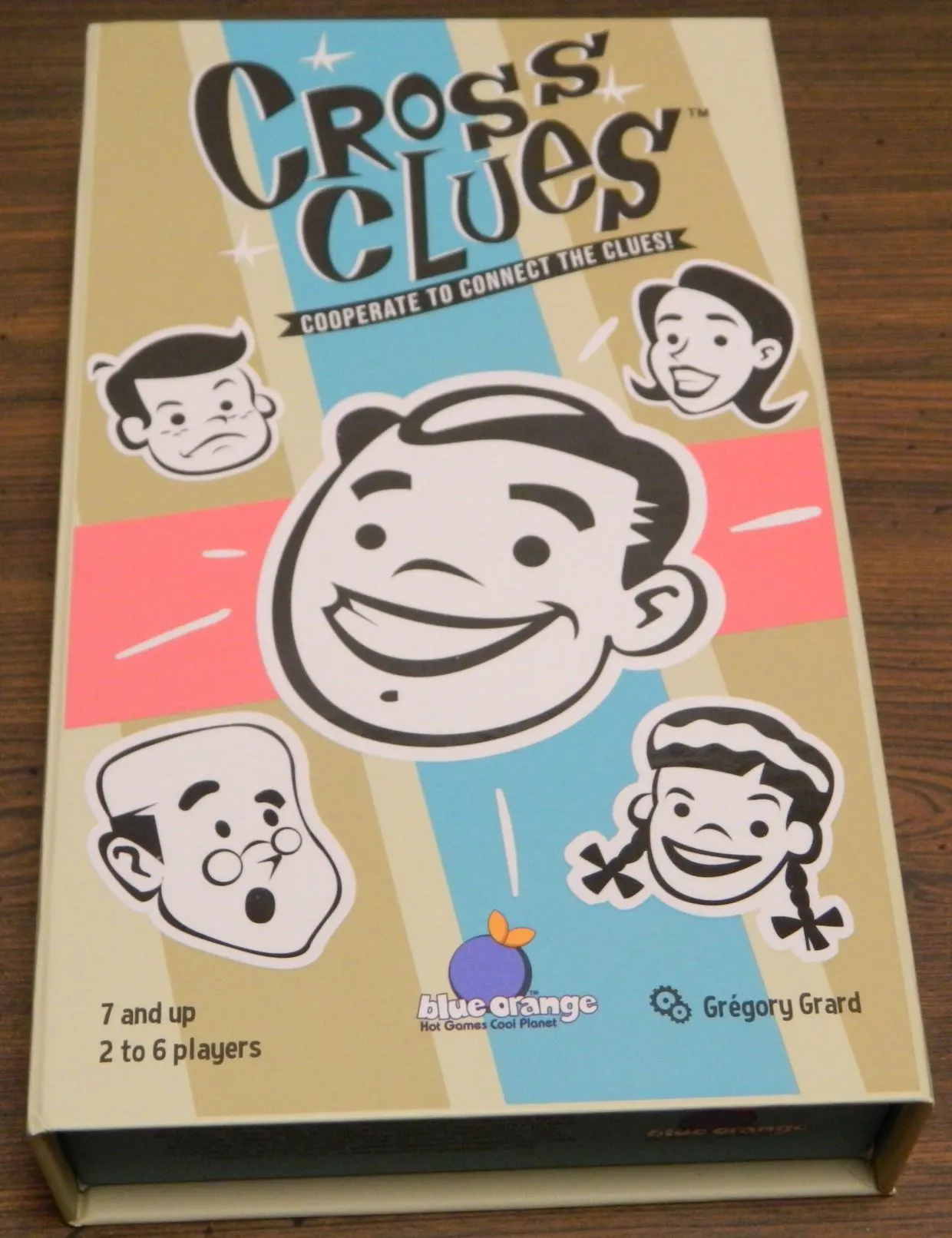
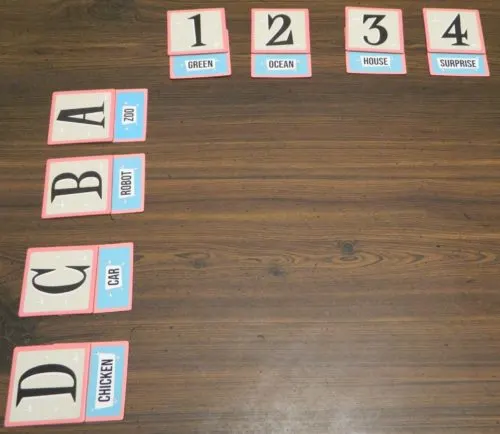
josh
Thursday 5th of August 2021
I played this game only one time so far. We have a suggestion re the one problem the reviewer highlighted. (ie, You have, say, A3 in your hand. Another person gives a clue for their own card, and people are debating if it's A3. "Insider information" problem.)
Our solution? You may give an alternative answer and explain why you think it's better than A3. You can't say, "I know it's not A3, or anything like that, of course." LOL. But you're welcome to convince people that the guess should be B5 or whatever. Of course, if you think the correct answer is B5, you should be doing this anyway, right? :-)
Eric Mortensen
Friday 6th of August 2021
I totally agree with your solution as this is basically the only way you can handle the issue. You obviously can't tell the other players that you know the choice that they are focusing on is wrong as that is definitely cheating. The best case scenario is to make a convincing argument to try and get them to choose a different answer. In some cases this is probably possible as there are are couple viable options. At least with our group though there are situations where it is really hard to try and convince the other players to change their minds without giving away that you know their current choice is wrong. If you push to hard for a different solution the other players figure out why you are doing so, but if you aren't insistent enough it kind of feels like you are just letting your group choose the wrong option. Our group found it hard to find the middle ground where a player looked like they just thought their choice was right and not trying to warn the other players of their inside information.
Despite this problem Cross Clues is still a great game that we really enjoy.
Grégory Grard
Friday 8th of May 2020
Thank you for this review, have fun !